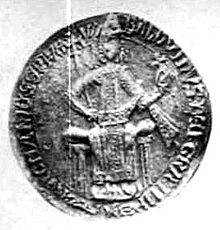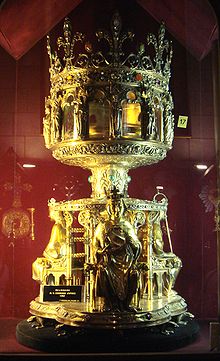User:LouisAragon/sandbox/Baldwin II
https://www.cngcoins.com/Coin.aspx?CoinID=115627
| Baldwin II | |
|---|---|
 Seal of Baldwin II | |
| Latin Emperor of Constantinople | |
| Reign | 1240-1261 |
| Coronation | 15 April 1240 |
| Predecessor | Robert of Courtenay |
| Successor | Michael VIII Palaiologos as Byzantine Emperor of Constantinople Philip of Courtenay as titular Latin Emperor of Constantinople |
| Regent | John of Brienne |
| Born | 1217 Constantinople |
| Died | October 1273 Naples |
| Spouse | Marie of Brienne |
| Issue | Philip of Courtenay |
| House | House of Courtenay |
| Father | Peter II of Courtenay |
| Mother | Yolanda of Flanders |
| Religion | Roman Catholicism |
Baldwin II, also known as Baldwin of Courtenay (French: Baudouin de Courtenay; late 1217 – October 1273), was the last monarch of the Latin Empire ruling from Constantinople. Still an infant when he was supposed to ascend the throne, the actual government was led by John of Brienne, the titular king of the Kingdom of Jerusalem. In 1240, Baldwin was formally crowned emperor.
Biography
[edit]Early life and de jure reign
[edit]Baldwin II was born in Constantinople in 1217, to Yolanda of Flanders and Peter II of Courtenay.[1][2] Yolanda's husband, Peter II of Courtenay, was third emperor of the Latin Empire, and had been followed by his son Robert of Courtenay, on whose death in 1228 the succession passed to Baldwin, then an 10-year-old boy.[1][2] Baldwin II was the only Latin Emperor to be born in Constantinople.[1]
The barons chose John of Brienne (titular king of the Kingdom of Jerusalem) as emperor-regent.[1] John in turn agreed that Baldwin would eventually succeed.[2] Baldwin also married Marie of Brienne, daughter of John, which further sealed the agreement.[2] When John died in 1237, Baldwin was in the West, trying to gather support for the Latin cause.[2] He mortgaged his possession, the County of Namur, to Louis IX of France for 50,000 livres parisis.[2] In around March 1238, Baldwin II's regency council pawned the Crown of Thorns to the Venetian podesta for 13,134 hyperpera from a "consortium of creditors".[3]
De facto reign
[edit]In late 1239, Baldwin returned to Constantinople through Hungary and was formally crowned emperor in 1240. The realm Baldwin governed was little more than the city of Constantinople.[1] He adopted the Byzantine title of porphyrogenetos.[1] Baldin once again travelled to the West where he was "given a place of honor at the first Council of Lyons in 1245".[2] His attendance made sure that Western support for the Latin cause put high on the agenda; however, there was "to be little effective aid because of Louis IX's plans for a crusade".[2] He was promised support by the Spanish Order of Santiago, but it failed to materialize.[2] Baldin was then apparently recuded to pleding his son Philip in order to raise money.[2]
Having failed to gather sufficient funds and support, the situation had become dire. On the night of 24 July 1261, a group of soldiers under Alexios Strategopoulos managed to enter Constantinople through a secret passageway and captured the city. Baldwin was asleep in the Blachernae Palace when the noise of the fighting awoke him; upon seeing the Byzantine troops advance upon him, he fled in such haste that he left his crown and sceptre behind him. Baldwin made his way to the harbor where he boarded a Venetian galley to Negropont.[4] Baldwin subsequently fled to the West, where he, once again, tried to gather support for a recapture of the city.[2] He managed to conclude a treaty with Charles I of Anjou at Viterbo in 1267.[2] According to the terms of the treaty, Baldwin relinquished suzerainty over the Principality of Achaea to Chalres against the promise of an expedition to recover Constantinople.[2]

| Capetian dynasty Cadets |
|---|
Ancestors
[edit]| Ancestors of LouisAragon/sandbox/Baldwin II | ||||||||||||||||||||||||||||||||||||||||||||||||||||||||||||||||||||||||||||||||||||||||||||||||||||||||||||||||||||||||||||||||||||||||||||||||||||||||||||||||||||||||||||||||||||||||||||||||||||||||||||||||||||||||||||||||||||||||||||||||||||||||||||||||||||||||||||||||||||||||||||||||||||||||||||||||||||||||||||||||||||||||||||||||||||||||||||||||||||||||||||||||||||||||||||||||||||||||||||||||||||||||||||||||||||||||||||||||||||||||||||||||||||||||||||||||||||||||||||||||||||||||||||||||||||||||||||||||||||||||||||||||||||||||||||||||||||||||||||||||||||||||||||||||||||||||||||||||
|---|---|---|---|---|---|---|---|---|---|---|---|---|---|---|---|---|---|---|---|---|---|---|---|---|---|---|---|---|---|---|---|---|---|---|---|---|---|---|---|---|---|---|---|---|---|---|---|---|---|---|---|---|---|---|---|---|---|---|---|---|---|---|---|---|---|---|---|---|---|---|---|---|---|---|---|---|---|---|---|---|---|---|---|---|---|---|---|---|---|---|---|---|---|---|---|---|---|---|---|---|---|---|---|---|---|---|---|---|---|---|---|---|---|---|---|---|---|---|---|---|---|---|---|---|---|---|---|---|---|---|---|---|---|---|---|---|---|---|---|---|---|---|---|---|---|---|---|---|---|---|---|---|---|---|---|---|---|---|---|---|---|---|---|---|---|---|---|---|---|---|---|---|---|---|---|---|---|---|---|---|---|---|---|---|---|---|---|---|---|---|---|---|---|---|---|---|---|---|---|---|---|---|---|---|---|---|---|---|---|---|---|---|---|---|---|---|---|---|---|---|---|---|---|---|---|---|---|---|---|---|---|---|---|---|---|---|---|---|---|---|---|---|---|---|---|---|---|---|---|---|---|---|---|---|---|---|---|---|---|---|---|---|---|---|---|---|---|---|---|---|---|---|---|---|---|---|---|---|---|---|---|---|---|---|---|---|---|---|---|---|---|---|---|---|---|---|---|---|---|---|---|---|---|---|---|---|---|---|---|---|---|---|---|---|---|---|---|---|---|---|---|---|---|---|---|---|---|---|---|---|---|---|---|---|---|---|---|---|---|---|---|---|---|---|---|---|---|---|---|---|---|---|---|---|---|---|---|---|---|---|---|---|---|---|---|---|---|---|---|---|---|---|---|---|---|---|---|---|---|---|---|---|---|---|---|---|---|---|---|---|---|---|---|---|---|---|---|---|---|---|---|---|---|---|---|---|---|---|---|---|---|---|---|---|---|---|---|---|---|---|---|---|---|---|---|---|---|---|---|---|---|---|---|---|---|---|---|---|---|---|---|---|---|---|---|---|---|---|---|---|---|---|---|---|---|---|---|---|---|---|---|---|---|---|---|---|---|---|---|---|---|---|---|---|---|---|---|---|---|---|---|---|---|---|---|---|---|---|---|---|---|---|---|---|---|---|---|---|---|---|---|---|---|---|---|---|---|---|---|---|---|---|---|---|---|---|---|---|---|---|---|---|---|---|---|---|---|---|---|---|---|---|---|---|---|---|---|---|---|---|---|---|---|---|---|---|---|---|---|---|---|---|---|---|---|---|---|---|---|---|---|---|---|---|---|---|---|---|---|---|---|---|---|---|---|---|---|---|---|---|---|---|---|---|---|---|---|---|---|---|---|---|
| ||||||||||||||||||||||||||||||||||||||||||||||||||||||||||||||||||||||||||||||||||||||||||||||||||||||||||||||||||||||||||||||||||||||||||||||||||||||||||||||||||||||||||||||||||||||||||||||||||||||||||||||||||||||||||||||||||||||||||||||||||||||||||||||||||||||||||||||||||||||||||||||||||||||||||||||||||||||||||||||||||||||||||||||||||||||||||||||||||||||||||||||||||||||||||||||||||||||||||||||||||||||||||||||||||||||||||||||||||||||||||||||||||||||||||||||||||||||||||||||||||||||||||||||||||||||||||||||||||||||||||||||||||||||||||||||||||||||||||||||||||||||||||||||||||||||||||||||||
References
[edit]Sources
[edit]- Harris, Jonathan, Byzantium and the Crusades, Bloomsbury, 2nd ed., 2014. ISBN 978-1-78093-767-0
- Lock, Peter (2013). The Franks in the Aegean: 1204-1500. Routledge. ISBN 978-1317899723.
- Nicol, Donald M. (1993). The Last Centuries of Byzantium, 1261-1453 (2 ed.). Cambridge University Press. ISBN 978-0521439916.
- Rosser, John H. (2001). Historical Dictionary of Byzantium. Scarecrow Press. ISBN 978-0810866218.
- Wolff, Robert L. (1954). "Mortgage and Redemption of an Emperor's Son: Castile and the Latin Empire of Constantinople". Speculum. 29 (29): 45–84. doi:10.2307/2853868. JSTOR 2853868.
- Angold, Michael J. (1991). "Baldwin II". In Kazhdan, Alexander (ed.). The Oxford Dictionary of Byzantium. Oxford and New York: Oxford University Press. ISBN 0-19-504652-8.
